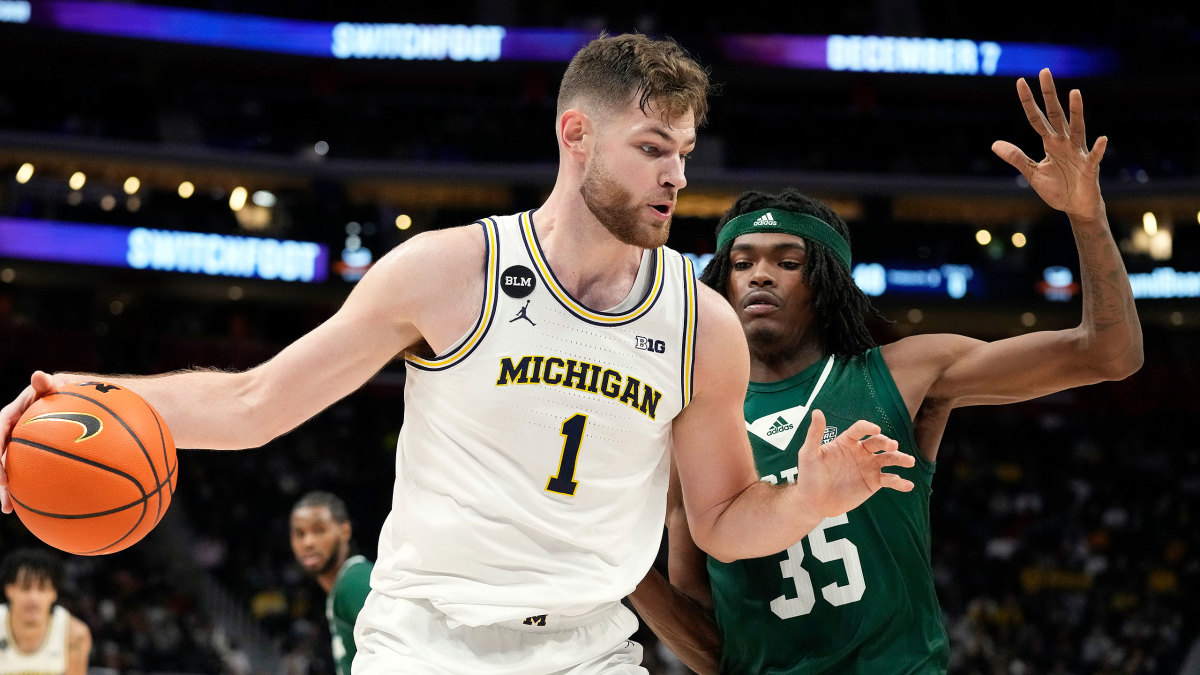Hunter Dickinson Among Athletes Calling for Revenue-Sharing Model in College Sports

During Wednesday night’s men’s basketball game between Pitt and Michigan, at least one player from each team will play with the letter “S” written on their hand.
The “S” stands for “share,” which is short for “revenue share,” which is something a group of college athletes believe they deserve. That group includes Michigan All-American center Hunter Dickinson, who will be wearing the “S” during the game against the Panthers.
“We deserve the same freedoms and protections under the law as other Americans,” Dickson said in a statement. “We need the U.S. Department of Justice to eliminate NCAA compensation restrictions that rob thousands of college athletes of what would be the most valuable years of our lives.”

The display Wednesday is a sort-of kickoff to a campaign from the National College Players Association that calls for NCAA sports revenue to be shared equitably with athletes in a movement the organization has dubbed #FairRevShare.
In a statement that quotes Dickinson and several current college athletes, the NCPA released goals for the campaign that include requiring schools to (1) share revenue with athletes; (2) protect freedoms connected to name, image and likeness deals (NIL) in light of potential Congressional involvement; (3) preserve all sports (eliminating sports teams is “not justified,” the release says); (4) abide by Title IX; (5) improve graduation rates by extending scholarships to six years; and (6) enforce safety standards while paying athlete medical expenses.
Pitt guard Jamarius Burton will wear the “S” on Wednesday as well.
“No athlete should face these unfair restrictions. It’s especially harmful to athletes from low-income homes, many of whom are Black,” Burton said in the release.
In its statement, the NCPA says that athletes at 10 Division I schools are generating support among their teammates for the campaign.
“The ‘S’ on our hands is a call for economic freedom and fairness,” Dickinson said in the statement. “I may be gone before change happens, but I want to do my part to stand up for the freedoms of younger athletes and future generations. The time for fair revenue share is long overdue.”
The NCAA limits what schools can provide to athletes to athletic scholarships and, for the most part, prohibits any direct pay to players. The NCPA and its executive director, Ramogi Huma, have been some of the most public critics of the NCAA’s amateurism rules. The group got a victory in June 2021 when the U.S. Supreme Court unanimously ruled against the NCAA in a case over education-related athlete benefits.
The ruling further eroded the association’s bedrock of amateurism at a time when state laws opened the door for athletes to begin earning compensation from their NIL, now a flourishing industry that’s seen brands and boosters distribute millions to college players.
The NCAA, itself caught in a purgatory between amateurism and professionalism, continues to be pushed toward the professional model, and many believe more change is on the way. That includes revenue sharing as well as employment status.
The NCPA’s latest campaign is part of an athlete-rights movement that has generated sweeping changes to archaic NCAA policies governing athlete compensation and transfer policies. It follows a complaint made by the NCPA with the Department of Education in March, which was forwarded on to the U.S. Equal Opportunity Commissioner (EEOC) this summer. The complaint asserts that all 350 NCAA Division I schools are violating Black students’ civil rights by colluding to cap compensation.
In February, the NCPA also filed unfair labor practice charges with the National Labor Relations Board (NLRB) against the NCAA office, the Pac-12 Conference and California schools USC and UCLA. The goal is to affirm employee status for D-I basketball players and FBS football players.
The athlete-employment and revenue-sharing debates have gained momentum over the last several years as revenue growth within the college sports industry continues to expand in varying ways, mostly because of men’s basketball and football. For instance, in the most recent revenue windfalls, the Big Ten struck a TV deal to earn $1.1 billion annually, and leaders just approved an expansion to the College Football Playoff that could fetch $2 billion a year.
Even many within college sports believe that employment status is coming for college athletes at some point. The EEOC represents one of four possible routes for that to happen. The National Labor Relations Board is another possibility. The Board’s general counsel, appointed by President Joe Biden, expressed an openness to rule college athletes as employees.
In Pennsylvania, a court case, Johnson v. NCAA, is working its way through the system that would make athletes employees. The fourth route to athlete employment status is Congress. Several Congressional bills could lay a legal path for schools to provide athletes collective bargaining rights and even revenue-sharing provisions.
More College Basketball Coverage:
• Kansas’s ‘Championship DNA’ Prevails Over Duke
• Tom Izzo’s Idle Offseason Turning Into a Smart Bet
• What’s Wrong With Louisville?
